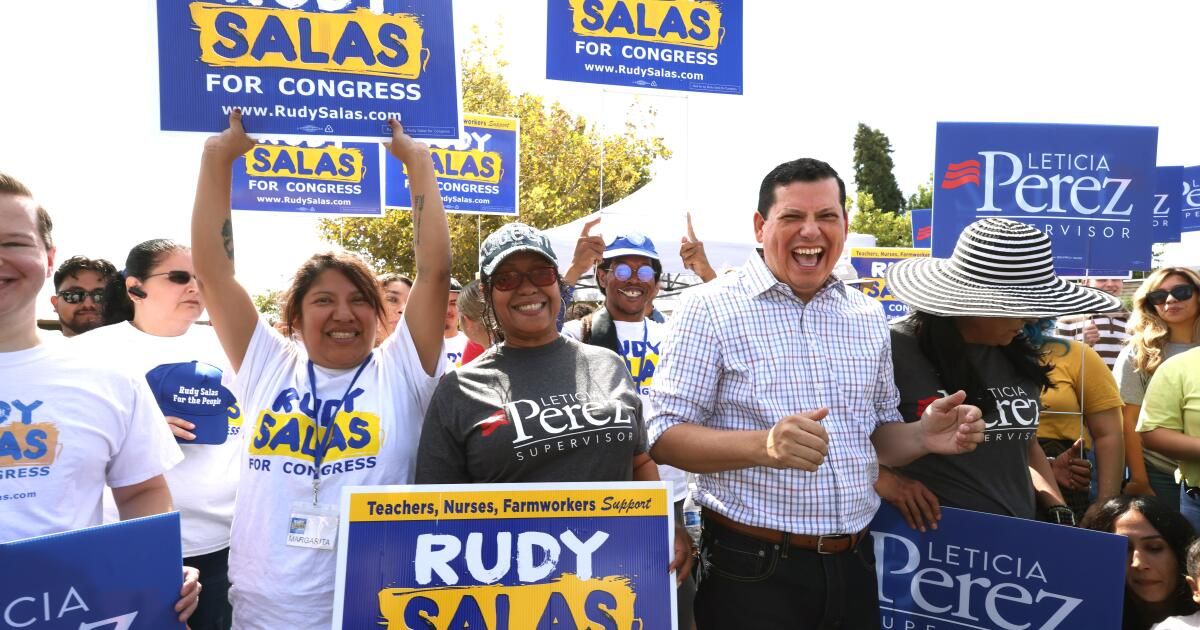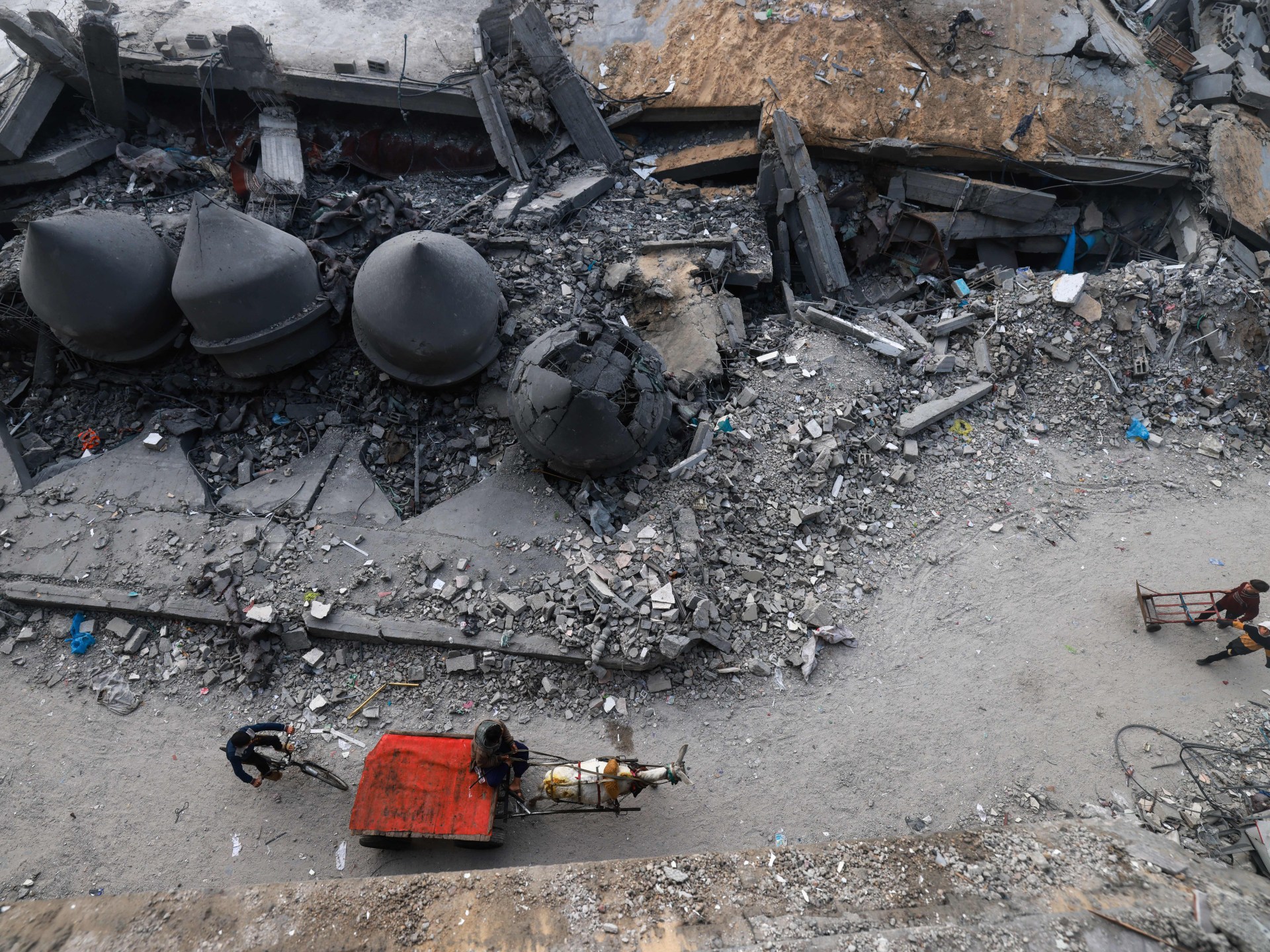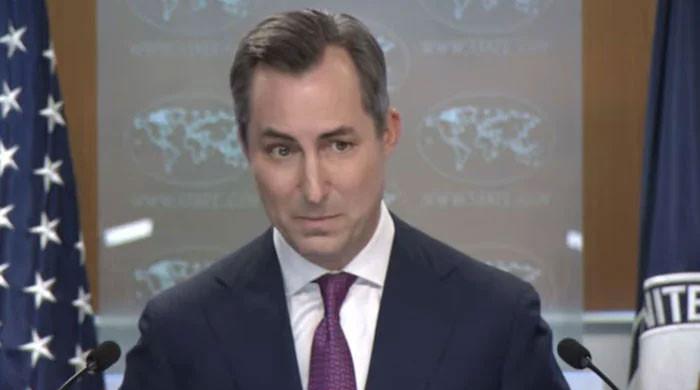The sky was gracefully cloudy on a recent Saturday morning as a group of people from all corners of Kern County gathered in a parking lot.
The mood was relaxed, with many wearing T-shirts declaring their support for Rudy Salas, the Democrat running to represent the 22nd Congressional District, a sprawling rural area in the southern Central Valley. A whiteboard reminded volunteers of the looming deadline: Election Day is Nov. 5.
“Are you guys excited? Ready? Eager?” Salas asked the crowd of about 40 people, who responded with applause and cheers. He instructed the promoters to remind voters of his accomplishments during his 10-year service in the California Assembly. That included his work to secure $100 million for the California State University system and another $100 million for Bakersfield College.
“This election really comes down to a handful of votes,” he said. “In the end, you are going to make the difference.”
In some ways, Salas summed up what congressional elections in the Central Valley typically look like: narrow margins. In 2022, Salas lost to incumbent Republican Rep. David Valadao by about 3,100 votes in a district of 775,000. In that same election, another Democrat in a district to the north lost to a Republican by 564 votes.
While California's metropolitan areas are deeply Democratic and progressive, the Central Valley follows a different pattern. Congressional District 22 encompasses parts of Kern, Kings and Tulare counties, from Hanford south to Bakersfield. The economy is dominated by agriculture, and more than 70 percent of residents are Latino.
On paper, the district leans Democratic (43% of voters are registered as Democrats, compared with 26% registered as Republicans and 23% registered with no party preference). But the region tends to defy labels and regularly elects Republicans to Congress.
Moderate Democrats in the area have been dubbed “Valleycrats” to indicate their preference for voting for the person they believe will do the best job for the district rather than sticking with one party.
Flor Olvera speaks with youth in Wasco while campaigning for Democratic Congressional candidate Rudy Salas.
(Genaro Molina / Los Angeles Times)
Democratic leaders hope Salas, 47, can win their trust, flip the district and bolster their efforts to regain the majority in a closely divided U.S. House of Representatives. Salas was the first Latino elected to the Bakersfield City Council and would be the first Latino to represent the Central Valley in Congress.
“California will decide control of Congress, and the Central Valley is at the center of that effort,” said Dan Gottlieb, spokesman for the Democratic Congressional Campaign Committee, in a statement. Salas, he said, has an army of volunteers, tangible momentum and a “better understanding of the realities families across the Valley face every day.”
But winning here means overtaking Valadao, another Central Valley native who remains popular among moderates. Valadao’s family started a dairy business in the Central Valley shortly after emigrating from Portugal in 1969. He was born and raised in Hanford and works in the family business. His family now owns two dairies in Kings County.
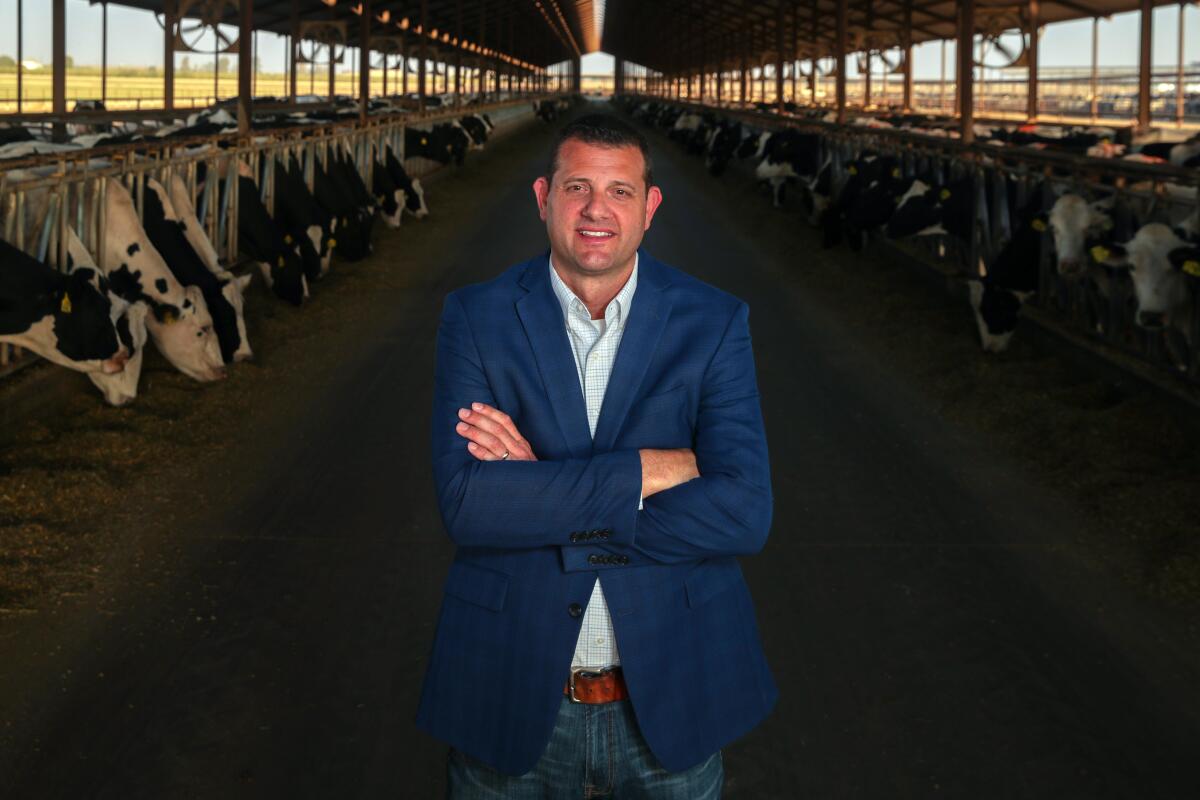
Republican Rep. David Valadao, a dairy farmer, says he is running for re-election so he can continue fighting for water and resources for the Central Valley.
(Irfan Khan/Los Angeles Times)
Valadao was first elected to Congress in 2012 and regained the seat in 2020 after losing in 2018. From his post on the House Appropriations Committee, he has fought to keep federal and state water flowing to Central Valley farms amid years of drought and regulatory cuts.
In an interview, Valadao, 47, said he knows the district better than Salas and is running for reelection so he can continue advocating for resources for the Central Valley. In Congress, he has largely voted along Republican party lines. Most recently, he helped secure $6 million in federal funding to help the city of Delano create a new drinking water well and another $3.5 million to build a regional access road in Porterville.
“I think people are seeing how hard I’ve worked in the district and our numbers have improved,” Valadao said. “It’s about getting out and talking to constituents, finding out what’s going on, listening to them directly, spending time in the district, looking at things and working on issues to try to make their lives a little bit better.”
Dolores Coronado Maas, 79, is a registered Republican and a resident of Hanford. Maas said she intends to vote for Vice President Kamala Harris, a Democrat, for president but will vote for Valadao for Congress because of his work with veterans and his vote to impeach then-President Trump in 2021. Valadao was one of 10 Republicans who voted to impeach Trump for his role in the Jan. 6, 2021, Capitol riot. She has not endorsed Trump’s election bid.
While the impeachment vote is controversial among some conservative voters, Maas said she appreciates Valadao standing up to Trump, who she says wants to take women back to an era when their reproductive rights were restricted. She said she believes Valadao, her “favorite Republican,” will continue to stand firm against Trump.
“I can't say anything against it [Valadao]“He has guts,” she said.
Salas, a CSU Bakersfield professor, was born into a Central Valley farmworker family and grew up working in the fields. He said he decided to run for Congress again because he believes district residents are excited about the prospect of a change in leadership.
“We feel it, we see it, we hear it in every community across the district,” she said. “It’s just about getting people to take the time to cast their ballot. We know the support is there.”
Among the activists who spent a Saturday morning last month knocking on doors for Salas was Flor Olvera, president of the Democratic Women of Kern. Olvera said she supports Salas because of her work to uplift farmworkers and Latinos in the region when she served in the state Assembly.
“Like Kamala [Harris] “Rudy needs a House to be successful, Rudy needs advocates here at home to be successful,” said Olvera, who is running for a seat on the Kern Community College District board. “I’m very excited.”
Both candidates have attacked each other, criticizing their opponent for taking votes they say do not favor district residents.
Salas criticized Valadao for voting against the Inflation Reduction Act, a wide-ranging climate, energy and health care bill that, among other changes, capped the monthly cost of insulin for Medicare enrollees at $35. Congress ultimately passed the measure, and President Biden signed it into law in 2022.
Salas also highlights the contrast between him and Valadao on reproductive rights.
Salas supported a statewide ballot measure that successfully passed in 2022, Proposition 1, which enshrined the rights to contraception and abortion in the California Constitution. In Congress, Valadao co-sponsored the Life from Conception Act, a failed bill that would have banned abortion nationwide with no exceptions.
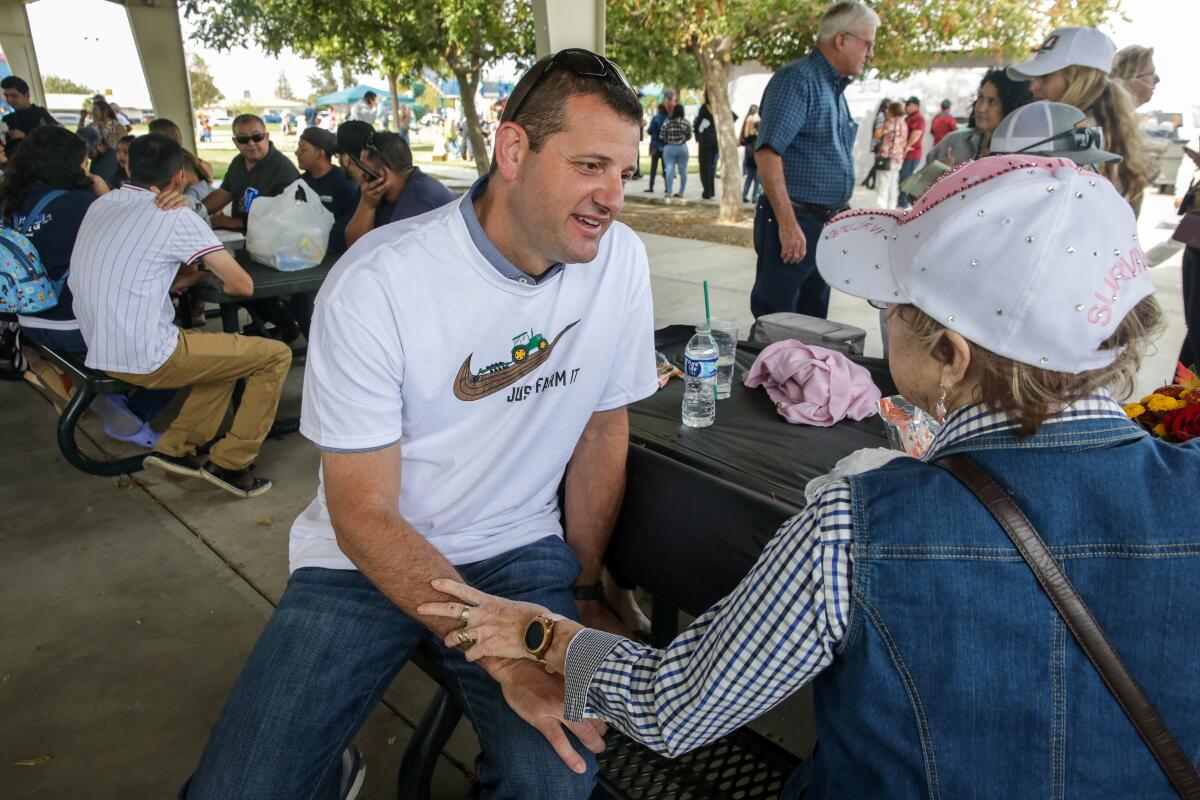
“I think people are seeing how hard I've worked in the district and our numbers have been improving,” Republican Rep. David Valadao said of his re-election bid.
(Irfan Khan/Los Angeles Times)
Valadao has since softened his stance. In an interview, he said that after “spending more time on the issue,” he now supports exceptions in cases of rape, incest and if the mother’s life is at risk.
But she also disputed the idea that reproductive rights are a hot-button issue in her district, saying the last time it came up in her discussions with constituents was years ago, with a group of seventh-grade girls who were against abortion.
“The state of California is not going to change its rules anytime soon, so it’s not an issue for most Californians,” Valadao said.
District 22 voters, she said, are concerned about water rights, homelessness, crime and affordable housing. She points to her work to secure funding for the new Delano well, a homeless shelter in Bakersfield and resources for law enforcement, including $622,000 for a Wasco Police Department dispatch center.
Salas said her record in the Assembly shows she understands how issues such as health care costs, access to education and immigration reform affect the daily lives of district residents.
As an Assembly member, Salas voted to raise the minimum wage and supported a landmark 2016 law granting farmworkers overtime pay when they work more than 40 hours a week. In 2017, he broke from the Legislature’s Democratic ranks to vote against a gas tax increase, saying he was concerned about the impact on families. The decision cost him his leadership role on a key legislative committee.
His campaign volunteers have been knocking on doors on weekends in hopes of getting people to vote.
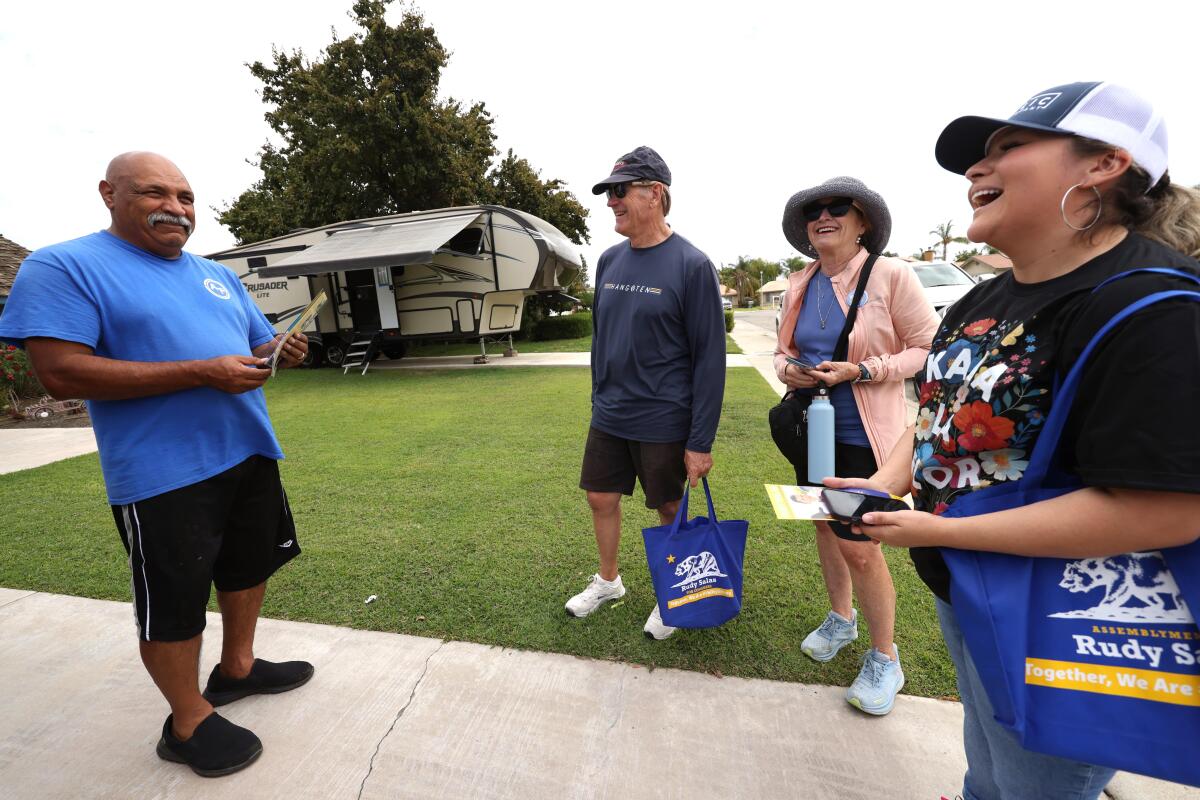
Flor Olvera, from right, Rosann Wattonville and her husband, Tom, talk with Joe Cardenas while knocking on doors for Democrat Rudy Salas in Wasco.
(Genaro Molina / Los Angeles Times)
On a recent Saturday, while working in a Wasco neighborhood, Rosann and Tom Wattonville encountered Joe Cardenas, a 60-year-old HVAC technician who was working on his truck in his driveway. Cardenas said he intends to vote for Salas, but not Harris. He said Salas’ background resonated with him; he, too, grew up working in the fields.
“He does a lot of good for Latinos; [he’s done] “It’s a lot of work for us low-income people,” Cárdenas said.
But many voters are still undecided. At Elite Fades, a barbershop in Hanford, owner Kenwin Charles sparred with a customer about the election and Trump’s pronouncements about improvements made during his presidency.
“He was just talking crazy,” said Charles, 46, while working with a client.
Charles said he had decided to vote for Harris because he wants to see a woman leading the country, but that he was still considering the two congressional candidates. Valadao, he said, was the kind of politician who promises 10 things and delivers only two, and he was not happy with her record so far.
“I will check it out when the time comes,” he promised. “Sometimes change is good.”

